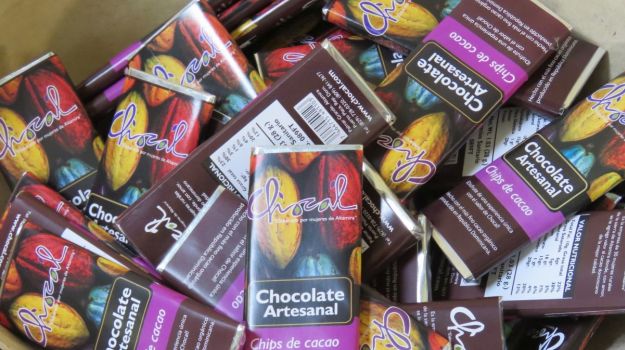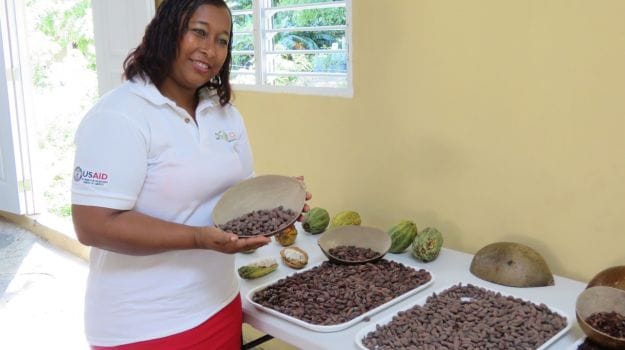Noemi Crisostomo, founding member of Chocal. Credit: Copyright 2015 Dana RebmannIt doesn't matter where you live or what language you speak: Good food can bring strangers to a table and, in a short period of time, make them friends. But in Palmar Grande, a town in the Dominican Republic, it's doing something even more powerful: It's creating social and economic change.In this country, 40% of the populace lives below the poverty line, and the average household income is below $6,000. For a group of 30 women who needed to work but didn't want to leave their families in search of jobs, the solution was to band together: In 2008, they created Chocal. Cacao is a primary crop for area farmers, so making chocolate seemed a natural choice. Along with ready-to-eat artisanal sweets, they sell bolas, which are used to make hot chocolate, and even tropical wines in flavors like cherry, star fruit, tangerine and, of course, cocoa. I met many members of this women's collective when visiting the area as a guest of the cruise line Fathom.
The nuts of chocolate-factory work...Their rustic facility may not have the polished image that one typically associates with chocolatiers. It's located off the beaten path on the island's north coast, where travelers by foot and horseback comprise a regular portion of daily traffic. But it's obviously loved and cared for, and the aroma of roasting cocoa beans lets you know you're in the right place.Making chocolate is nowhere near as glamorous as it sounds. Far from the shiny, modern kitchens of television cooking shows, Chocal has only basic machinery; much of the work is done the old-fashioned way. A group of gals sorting cocoa beans by hand while keeping a watchful eye on the roasting machines is the closest thing you'll find to an assembly line here....And the boltsThe aluminum-like foil to wrap chocolate bars is cut by hand, using a sturdy piece of cardboard as a guide to ensure the size is right. After the foil covers are folded around hand-molded rectangular blocks, a decorative wrapper is secured in place by a steady pair of hands wielding a glue gun. The women smile as they talk about their work, and even if you don't understand a word of Spanish, it's obvious they love what they do.Some are here five days a week, others are part-time; Chocal isn't the type of business that's run by crunching numbers. When a big order comes in, many will pick up weekend shifts. And the night before an order ships, it's not unusual to find all the women working late. When help is needed, whether on the factory floor or in the office, someone is always there.
 An assortment of Chocal bars. Credit: Copyright 2015 Dana RebmannMeasuring sweet successTo an outsider, the odds of Chocal's success might seem slim. Some of the women -- who range from about 30 to over 50 years old -- are unable to read or write, and none had culinary training when they began the company. But throw the classic business model out the window, and what's left is a group of women who believed chocolate could be used to cultivate their community. "We wanted to change our quality of life," founder Noemi Crisostomo told me through a translator. At 38, the mother of three children ages 15 to 22 has gone from unemployment to co-ownership in record time.Over a decade, the collective has grown at a healthy pace. When it began, the women volunteered their time; today they receive wages, but a majority of their profits is being used to pay back a government loan that allowed them to renovate their facilities and invest in some machinery to improve production. Still, the pay they do receive is helping to make big changes in their lives and the lives of their families. Crisostomo is one of two of the women now studying at a local university; another's son is also enrolled thanks to earnings from Chocal. Cement has replaced dirt in the floors of many of their homes. Their kitchens are stocked with better food, and their kids have new books and clothes for school.A new opportunity for growthTheir sweet goods are now stocked on the shelves of a major local grocery chain. But growth means expanding into new markets and developing the flexibility to respond to increased yet still fluctuating demand. Chocal may have found a way to deal with both in cruise line Fathom.The connection makes great business sense. Fathom is reinventing the idea of a cruise vacation by adding volunteer opportunities to the package. When travelers arrive at Amber Cove, the Caribbean's first new cruise port in nearly a decade, they won't flock to the beach -- they'll head to Chocal's kitchen to help make chocolate.Volunteer vacationingWith activities like sorting through cocoa beans and tempering chocolate, this field trip for ship guests sounds like a cooking class, but it's actually a sweet community-service project. Chocolate-making cruisers have the potential to boost Chocal's production and push an ambitious group of remarkable entrepreneurs to the next level of success.Of course, after a day of rolling up their sleeves and creating chocolate confections, the travelers turned freelance chocolatiers are sure to buy a few bars to take home. (I know from experience that it's hard to resist.) As more cruise ships dock here, more tourists buy chocolate. It's a vacation sugar rush that's good for everyone involved.Copyright 2016 Dana Rebmann via Zester Daily and Reuters Media Express(This story has not been edited by NDTV staff and is auto-generated from a syndicated feed.)
An assortment of Chocal bars. Credit: Copyright 2015 Dana RebmannMeasuring sweet successTo an outsider, the odds of Chocal's success might seem slim. Some of the women -- who range from about 30 to over 50 years old -- are unable to read or write, and none had culinary training when they began the company. But throw the classic business model out the window, and what's left is a group of women who believed chocolate could be used to cultivate their community. "We wanted to change our quality of life," founder Noemi Crisostomo told me through a translator. At 38, the mother of three children ages 15 to 22 has gone from unemployment to co-ownership in record time.Over a decade, the collective has grown at a healthy pace. When it began, the women volunteered their time; today they receive wages, but a majority of their profits is being used to pay back a government loan that allowed them to renovate their facilities and invest in some machinery to improve production. Still, the pay they do receive is helping to make big changes in their lives and the lives of their families. Crisostomo is one of two of the women now studying at a local university; another's son is also enrolled thanks to earnings from Chocal. Cement has replaced dirt in the floors of many of their homes. Their kitchens are stocked with better food, and their kids have new books and clothes for school.A new opportunity for growthTheir sweet goods are now stocked on the shelves of a major local grocery chain. But growth means expanding into new markets and developing the flexibility to respond to increased yet still fluctuating demand. Chocal may have found a way to deal with both in cruise line Fathom.The connection makes great business sense. Fathom is reinventing the idea of a cruise vacation by adding volunteer opportunities to the package. When travelers arrive at Amber Cove, the Caribbean's first new cruise port in nearly a decade, they won't flock to the beach -- they'll head to Chocal's kitchen to help make chocolate.Volunteer vacationingWith activities like sorting through cocoa beans and tempering chocolate, this field trip for ship guests sounds like a cooking class, but it's actually a sweet community-service project. Chocolate-making cruisers have the potential to boost Chocal's production and push an ambitious group of remarkable entrepreneurs to the next level of success.Of course, after a day of rolling up their sleeves and creating chocolate confections, the travelers turned freelance chocolatiers are sure to buy a few bars to take home. (I know from experience that it's hard to resist.) As more cruise ships dock here, more tourists buy chocolate. It's a vacation sugar rush that's good for everyone involved.Copyright 2016 Dana Rebmann via Zester Daily and Reuters Media Express(This story has not been edited by NDTV staff and is auto-generated from a syndicated feed.)
The nuts of chocolate-factory work...Their rustic facility may not have the polished image that one typically associates with chocolatiers. It's located off the beaten path on the island's north coast, where travelers by foot and horseback comprise a regular portion of daily traffic. But it's obviously loved and cared for, and the aroma of roasting cocoa beans lets you know you're in the right place.Making chocolate is nowhere near as glamorous as it sounds. Far from the shiny, modern kitchens of television cooking shows, Chocal has only basic machinery; much of the work is done the old-fashioned way. A group of gals sorting cocoa beans by hand while keeping a watchful eye on the roasting machines is the closest thing you'll find to an assembly line here....And the boltsThe aluminum-like foil to wrap chocolate bars is cut by hand, using a sturdy piece of cardboard as a guide to ensure the size is right. After the foil covers are folded around hand-molded rectangular blocks, a decorative wrapper is secured in place by a steady pair of hands wielding a glue gun. The women smile as they talk about their work, and even if you don't understand a word of Spanish, it's obvious they love what they do.Some are here five days a week, others are part-time; Chocal isn't the type of business that's run by crunching numbers. When a big order comes in, many will pick up weekend shifts. And the night before an order ships, it's not unusual to find all the women working late. When help is needed, whether on the factory floor or in the office, someone is always there.

Advertisement









